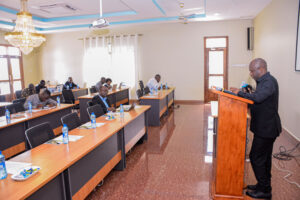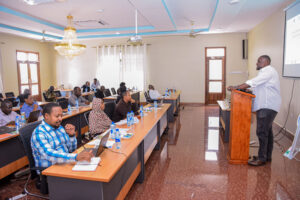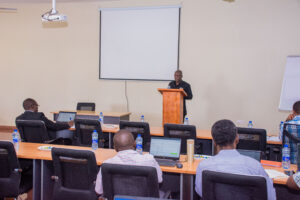Dodoma, March 13, 2024 – The Plant Health and Pesticides Authority (TPHPA), in collaboration with the Food and Agriculture Organization (FAO) through the STREPHIT project, convened key stakeholders at the Mesuma Hotel Conference Hall to review, discuss, and validate the National Strategy for the Control of Banana Bunchy Top Virus (BBTV).
The event, officially opened by Mr. Musa Chidinda, representing TPHPA Director General, Prof. Joseph Ndunguru, marks a crucial milestone following a rigorous five-day workshop in February that laid the foundation for developing the National Strategy for the Eradication of BBTV (March 2025 – March 2030). This strategic document will guide national efforts to tackle BBTV, a destructive disease already threatening smallholder banana farmers across Tanzania.
The Growing Threat of BBTV
BBTV was first detected in Buhigwe District, Kigoma Region, in 2021 and has since spread to 15 districts. The disease, caused by Babuvirus (Nanoviridae family) and transmitted through infected plant material and the banana aphid (Pentalonia nigronervosa), poses a significant risk to banana production—a staple food crop that sustains millions of Tanzanians.
During the opening session, Mr. Chidinda emphasized the urgent need for action, noting that despite ongoing government efforts, BBTV remains a major challenge. TPHPA’s response includes farmer education, infected plant eradication, and the distribution of disease-free planting material. However, full containment of the virus is yet to be achieved, making this validation process a critical step forward.
A National Strategy for Eradication
The National Strategy for the Eradication of BBTV in Tanzania outlines a scientific and multi-sectoral approach to eliminating the virus. Key components include:
1. Surveillance & Early Detection – Strengthening monitoring systems to detect outbreaks quickly.
2. Infected Plant Removal – Systematic destruction of diseased plants to prevent further spread.
3. Vector Control – Managing banana aphids to curb disease transmission.
4. Quarantine & Regulation – Enforcing strict movement controls on banana planting material.
5. Promotion of Clean Planting Materials – Ensuring farmers access virus-free seedlings.
The strategy aligns with Tanzania’s Agricultural Development Agenda 2030 and contributes to global sustainability efforts, particularly:
-SDG 2 (Zero Hunger): Enhancing food security through resilient agricultural systems.
-SDG 1 (No Poverty): Protecting smallholder farmers’ livelihoods by safeguarding banana production.
Through community-led interventions, strong regulatory frameworks, and innovative technology, Tanzania aims to restore and protect its banana industry. The success of this initiative will depend on collaborative efforts among government agencies, research institutions, development partners, and, most importantly, farmers themselves.
Looking Ahead
With the validation of this national strategy, Tanzania takes a significant step toward securing its banana sector for future generations. The eradication of BBTV will not only protect farmers’ incomes but also strengthen national food security and economic stability.
Tokomeza Funga shada Linda Ndizi Zetu 🍌






Stop Banana Bunchy Top Protect our Bananas 🍌
